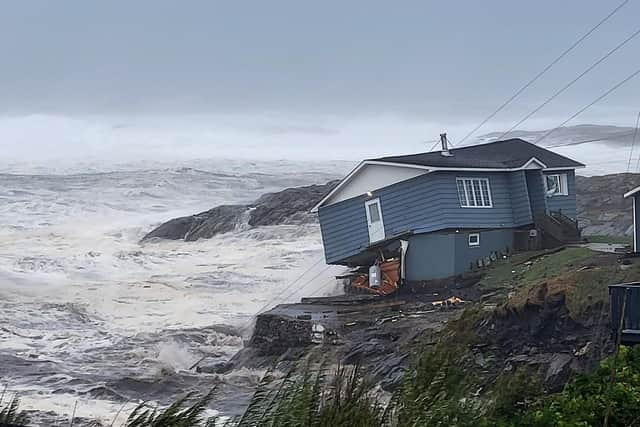Storm Fiona: Houses washed into sea as storm batters Canada
Canadian troops are being sent to assist the recovery from the devastation of storm Fiona, which swept away houses, stripped off roofs and knocked out power across the country’s Atlantic provinces.
After surging north from the Caribbean as a hurricane, Fiona came ashore before dawn on Saturday as a post-tropical cyclone, battering Nova Scotia, Prince Edward Island, Newfoundland and Quebec with hurricane-strength winds, heavy rains and huge waves.
Advertisement
Hide AdAdvertisement
Hide AdDefence Minister Anita Anand said that troops would help remove fallen trees and other debris, restore transportation links and do whatever else is required for as long as it takes. She did not specify how many troops would be deployed.


More than 415,000 Nova Scotia Power customers — about 80% of the province of almost 1 million people — were affected by outages on Saturday. Over 82,000 customers in the province of Prince Edward Island, about 95%, also lost power, while NB Power in New Brunswick reported 44,329 were without electricity.
Tropical storm warnings have been issued for the Atlantic provinces of Nova Scotia, Prince Edward Island, Newfoundland and New Brunswick, as well as in parts of Quebec.
Fiona was blamed for at least five deaths in the Caribbean, but there was no confirmation of any fatalities or serious injuries in Canada. Police said a woman who might have been swept away was listed as missing in the town of Channel-Port Aux Basques on the southern coast of Newfoundland.
Raging surf pounded Port Aux Basques and entire structures were washed into the sea.
“I’m seeing homes in the ocean. I’m seeing rubble floating all over the place. It’s complete and utter destruction. There’s an apartment that is gone,” said Rene J Roy, chief editor at Wreckhouse Press and a resident of the town.
Mr Roy estimated between eight to 12 houses and buildings had washed into the sea, adding: “It’s quite terrifying.”
The Royal Canadian Mounted Police said the town of 4,000 people was in a state of emergency with multiple electrical fires and residential flooding.
Advertisement
Hide AdAdvertisement
Hide AdAs the extent of damage became clear, Prime Minister Justin Trudeau cancelled his trip to Japan for the funeral of assassinated former prime minister Shinzo Abe.
“We are seeing devastating images coming out of Port aux Basques. PEI (Prince Edward Island) has experienced storm damage like they’ve never seen. Cape Breton is being hit hard, too,” Mr Trudeau said.
“There are people who see their houses destroyed, people who are very worried — we will be there for you.”
Mike Savage, mayor of Halifax, said the roof of an apartment building collapsed in Nova Scotia’s biggest city and officials had moved 100 people to an evacuation centre. He said there were no serious injuries.
Provincial officials said other apartment buildings sustained significant damage.
Power companies have warned that it could take days to restore electricity, as wind speeds remain too high to start work on downed power lines.
Severe hurricanes in Canada are rare, as storms normally lose their energy once they hit colder waters in the north and become post-tropical instead.
